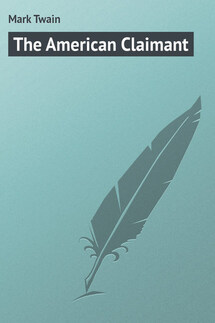Chapters from My Autobiography - страница 3
It is a world of surprises. They fall, too, where one is least expecting them. When I introduced Sellers into the book, Charles Dudley Warner, who was writing the story with me, proposed a change of Seller’s Christian name. Ten years before, in a remote corner of the West, he had come across a man named Eschol Sellers, and he thought that Eschol was just the right and fitting name for our Sellers, since it was odd and quaint and all that. I liked the idea, but I said that that man might turn up and object. But Warner said it couldn’t happen; that he was doubtless dead by this time, a man with a name like that couldn’t live long; and be he dead or alive we must have the name, it was exactly the right one and we couldn’t do without it. So the change was made. Warner’s man was a farmer in a cheap and humble way. When the book had been out a week, a college-bred gentleman of courtly manners and ducal upholstery arrived in Hartford in a sultry state of mind and with a libel suit in his eye, and his name was Eschol Sellers! He had never heard of the other one, and had never been within a thousand miles of him. This damaged aristocrat’s programme was quite definite and businesslike: the American Publishing Company must suppress the edition as far as printed, and change the name in the plates, or stand a suit for $10,000. He carried away the Company’s promise and many apologies, and we changed the name back to Colonel Mulberry Sellers, in the plates. Apparently there is nothing that cannot happen. Even the existence of two unrelated men wearing the impossible name of Eschol Sellers is a possible thing.
James Lampton floated, all his days, in a tinted mist of magnificent dreams, and died at last without seeing one of them realized. I saw him last in 1884, when it had been twenty-six years since I ate the basin of raw turnips and washed them down with a bucket of water in his house. He was become old and white-headed, but he entered to me in the same old breezy way of his earlier life, and he was all there, yet – not a detail wanting: the happy light in his eye, the abounding hope in his heart, the persuasive tongue, the miracle-breeding imagination – they were all there; and before I could turn around he was polishing up his Aladdin’s lamp and flashing the secret riches of the world before me. I said to myself, “I did not overdraw him by a shade, I set him down as he was; and he is the same man to-day. Cable will recognize him.” I asked him to excuse me a moment, and ran into the next room, which was Cable’s; Cable and I were stumping the Union on a reading tour. I said—
“I am going to leave your door open, so that you can listen. There is a man in there who is interesting.”
I went back and asked Lampton what he was doing now. He began to tell me of a “small venture” he had begun in New Mexico through his son; “only a little thing – a mere trifle – partly to amuse my leisure, partly to keep my capital from lying idle, but mainly to develop the boy – develop the boy; fortune’s wheel is ever revolving, he may have to work for his living some day – as strange things have happened in this world. But it’s only a little thing – a mere trifle, as I said.”
And so it was – as he began it. But under his deft hands it grew, and blossomed, and spread – oh, beyond imagination. At the end of half an hour he finished; finished with the remark, uttered in an adorably languid manner:









